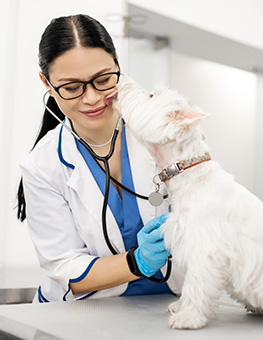Hartz Tips: Upgrading Your Canine's Overall Nutrition
Owning a pet can be a major expense of time, energy, and money. As a pet parent, you're probably looking for any way to cut down on your monthly costs.
One of the best ways to foster animal wellness is to invest in a quality dog food, which can inevitably help your pooch drop weight, improve a variety of physiological functions and may even increase his longevity. However, in light of pet food recalls and the confusing nature of pet food packaging, it can be difficult to find a brand of pet food that can actually make a difference. According to the Mother Nature Network, here are a few tips to keep in mind to spot unhealthy ingredients and sift through misinformation that you may find on pet food packaging.
- Nutritional content. While some dog foods may say that they are well-rounded and formulated to meet all of a canine's needs, there are elevated levels of ingredients that may not be good for your pooch long-term. Start by locating the "analysis" that should be on the side of each package that will list moisture, protein, fiber and fat content. Because dogs are carnivores, it's best to see that your dog's diet consists of 23-26 percent protein and close to 30 percent if you're opting for grain-free food.
- Additives. Byproducts and preservatives are other major stumbling blocks to look for when shopping for dog food. Since waste products like feet, intestines, and necks can be processed and put back into food, this might not be the best quality. Additionally, look for the language on the bag to be more specific - for instance, make sure if you're purchasing a bag of food that contains chicken, make sure that it contains "chicken" and not just "poultry."
Dogs with food allergies need an even greater care during the food selection process. According to Cesar’s Way, Chicken, beef, lamb, corn, soy, wheat, egg, and dairy products are common ingredients that can induce allergies. Pet parents must choose a food that does not include any of these ingredients but still preserved with vitamins and supplemented with fatty acids (fish oils). Most large food companies have their own versions of these kinds of foods often labeled as prescription foods and not significantly more expensive than over-the-counter foods of equivalent quality.
- Visit your vet. Ultimately, finding the right dog food comes down to talking to your veterinarian about your canine's activity level, age, and the overall nutritional deficiencies he or she may have in the blood. This will allow you to be a more informed consumer when you're browsing the pet store shelves, or your vet may suggest a prescription diet that is tailored to your companion's needs. Choosing the right diet for a dog is one of the most difficult parts of being a dog parent, so be ready for a bit of trial and error to find one that meets your furry friend's needs.
This content is provided by the pet grooming experts at Hartz. Our professional staff is here to keep you educated on the proper grooming techniques while offering tips to keep your pet happy and healthy.


















